From Magdeburg, the artist takes the train back through his home region of Thuringia, reflecting on the history of anti-Semitism and right-wing violence. We observe him looking out the train window. Dragons are superimposed over pictures on his smartphone. These fantastic beasts, invisible to others, accompany him on his journey as he visualizes them with a few strokes on the display.
Jung enhances his artistic process with a stream of consciousness focused on lyrical texts, interweaving personal experiences during the train journey with memories of and reports on anti-Semitism in the area. The individual acts are not historically reconstructed, but rather outlined associatively. Alleged minor offenses and much more serious crimes combine to form a collage that allows him to approach anti-Semitism in Thuringia emotionally.
Cows pigs East Germany
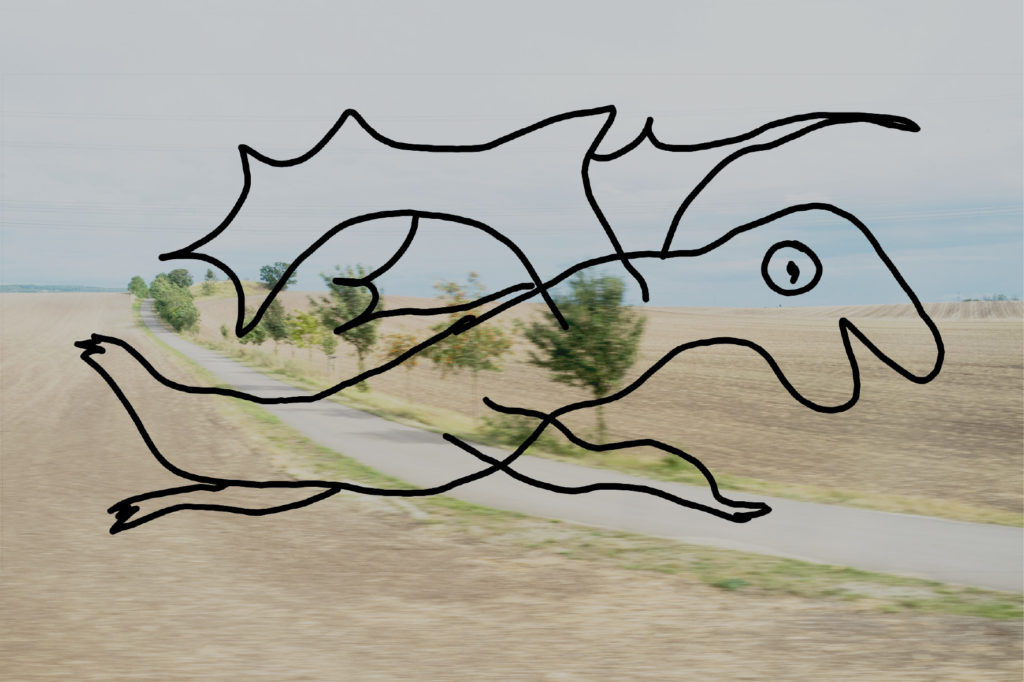
Trial.
Due to Halle.
A former roommate testifies:
Whenever he was cursing
he would say Jew at the end.
But they themselves
did that, too.
And said faggot and things like that.
It was normal, in a way.
They were young.
The Kripo Live reporter
next to me bangs away at her laptop
as if she were
landing a scoop
while everyday German life is being exposed
and the trial due to Halle in Magdeburg
picks up steam.
I get on the train.
German trees.
German fields.
Everyday German life.
Pass me by.
Ten years ago, we
traveled to small towns in Thuringia
on a tour bus
and called out,
“Cows pigs East Germany.”
It didn’t change anything
about the circumstances,
even if we were right.
German culture
is also always a sausage culture.
But what if you don’t eat pork?
You’ll have a hard time
finding something to eat along the highway.
My grandpa loved bratwurst.
And when he came home from work
and didn’t eat enough at lunch,
my grandma always said:
You must have eaten a bratwurst
on the road.
My grandfather was born two days
after Hitler came to power,
and he died on a day
when I was in Buchenwald.
Jewish people?
I didn’t know any for a long time.
I don’t know many now.
A dragon appears
on the horizon
and flies along with the train,
winking at me.
Flabbergasted,
I stare open-mouthed
at my fellow travelers.
But they act as if
nothing were out of the ordinary.
I look back out the window:
fields of crops,
trees and windmills.
In the city,
backyards are home to plastic chairs
and the occasional pool.
The sun streams
through the train windows.
Brightly colored plastic chairs
in front of peeling plaster,
decked with sticky,
sweaty,
wrinkly
white skin,
gathered around
a burning grill:
Not long now before
the sausages are brown enough.
The potato salad is ready and waiting.
A German army helicopter crosses
the train’s path overhead.
A different climate outside the window
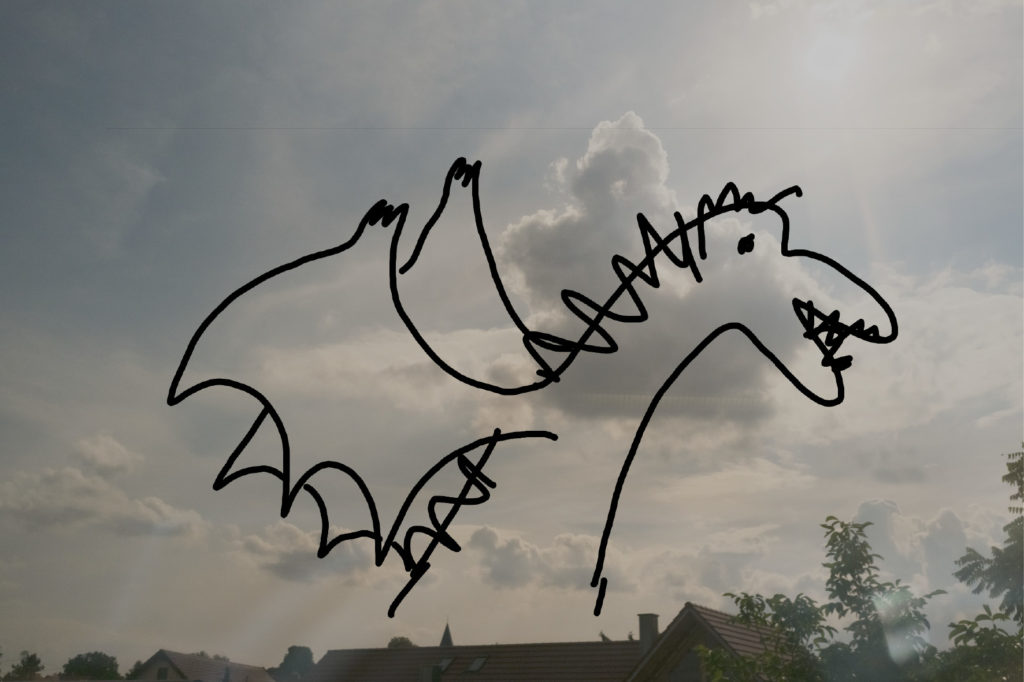
Back in the train.
More fields.
And trees.
Some are withered.
I’ve gotten used to the
dragon flying along beside me,
and the fact
that other than me,
no one in the train seems to notice.
My grandpa once
drove into a ditch
because he was watching
a red kite flying in the sky.
The sun has been shining
for three weeks straight.
In the new Germany,
the trains have A/C.
Outside,
in the climate past the window:
still a
nondescript landscape:
fields, trees, more fields.
Roads and scattered houses.
Power lines and windmills.
But castles, too.
Wonderful castles.
The wonderful Middle Ages
Wonderful barbarism.
And stuck in the wall’s cracks:
the hatred of Jews.
At Kunsthalle Erfurt:
photos of the liberation at Buchenwald.
I pass by
the New Synagogue,
firebombed by three Nazis
on Hitler’s birthday
in 2000.
On the way back,
a soldier asks me
if we know each other.
I say no.
He apologizes.
Afghanistan
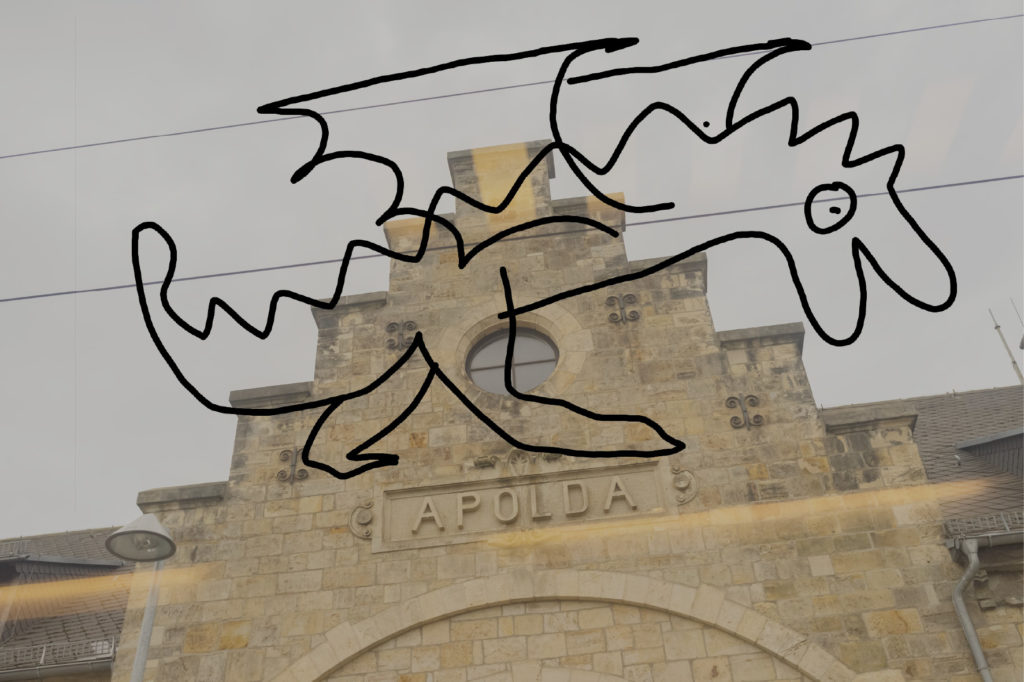
A woman explains to her husband
what she just read
in the Bild-Zeitung.
She reads it
in the part of the newspaper,
he has already worked through:
“In Gera they
demolished a refrigerated warehouse,
deliberately,
they had to
throw it all away.”
We stop in Apolda.
A pig’s head
laid in front of a Jewish memorial site.
It was in the newspaper.
At the time, on September 16, 2010.
The trains are once again
full of soldiers
coming home
from their dry war
or from a real one.
At one point,
a drunken federal policeman
in uniform staggered
through the train,
drinking a mixture
out of a 1.5-liter cola bottle.
He pounded on the train door
and shouted:
“I have to get out of here.”
Told the conductress
he was a police officer.
The conductress,
barely suppressing
a smile:
“I can see that.”
His colleagues came along,
went through his bag,
and only then noticed
their comrade was steadily
drinking out of his cola bottle.
They finally led him away.
One of the travelers explained
that the drunk had spoken
about his time in Afghanistan
as a police trainer
that he wouldn’t wish it
on his worst enemy.
At the side of the road
is a backyard
with a food truck
shaped like a bratwurst,
apparently left for scrap.
At the main train station in Erfurt,
a blind man
gets out with us.
The ticket collector asks
if he is looking for someone.
The blind man says:
“Yes,
a woman
in a colorful dress.”
Dentist
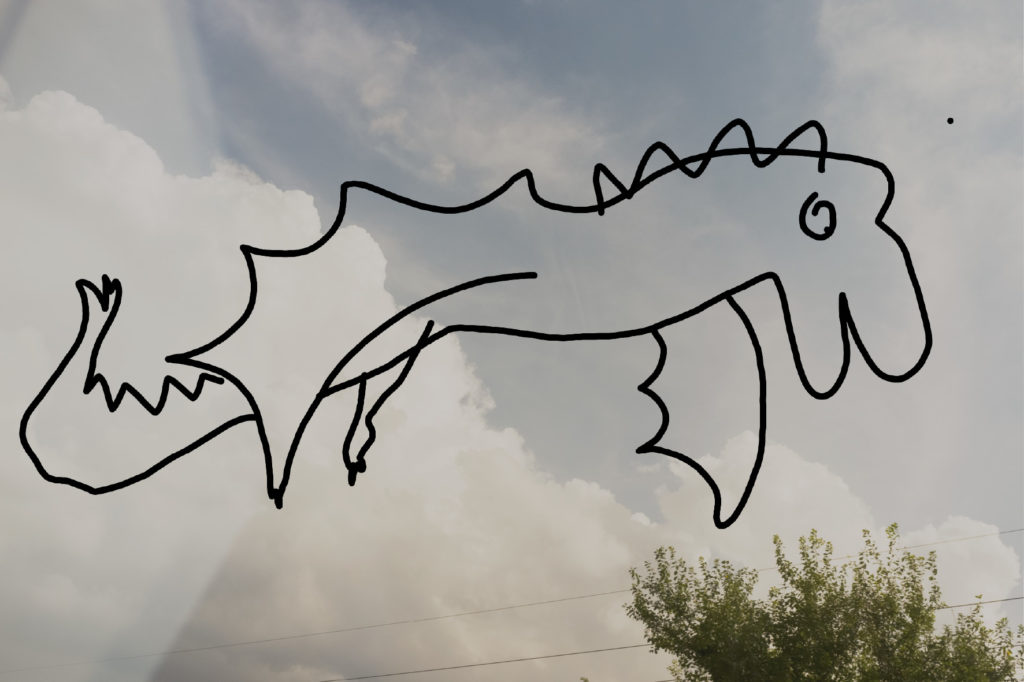
I’m sitting at the dentist.
We celebrated my
grandma’s birthday
at the nursing home yesterday.
My grandpa died last year.
My dentist is
the best-looking dentist in the world,
at least judging by the waiting room.
Therefore, I still make
a special trip from Leipzig to Jena,
to see my dentist
and visit
my family.
The dentist is done
and because he likes me,
he didn’t drill.
I’m sitting at the Jena West train station.
Across from the platform is a plaque:
“In memory of our
fellow Jena residents,
the racially persecuted
Jews, Roma and Sinti
who were deported
from here to
the fascist death camps.”
How must someone feel
who has to go to work
through this train station
every day,
someone whose family
the Nazis destroyed.
On Facebook, a photo of
an automobile scrapyard pops up:
“Dirty Jew” is scrawled
across the rear windshield
on one of the wrecked cars.
A poster for the
Marc Chagall exhibition
in Apolda
hangs at the Jena-Göschwitz train station.
I get on the train for Gera,
for the Otto Dix exhibition.
Was Otto Dix an anti-Semite, actually?
He was in the war.
But only the first one.
I’m looking forward to his work.
The sun is shining.
A guy sitting near me asks me
if there was a fire or something,
apparently meaning
a non-white person
sitting two rows away.
A little crestfallen,
he falls silent
when I don’t laugh
and pull my latop right
in front of his face.
When we stop in Stadtroda,
he collects the pieces
of his face
and gets off.
I’ve arrived in Gera.
I go to a bakery and
pick up a ham and cheese pretzel for € 1.50,
which feels like it weighs one kilo.
In front of me, a healthy-looking
young man waves around a piece of paper
saying
he doesn’t have to wear a mask.
The Otto Dix exhibition is wonderful.
The train runs along the Elster River.
The dragon floats along in it.
Why fly
when you
can let German water
carry you.
We pass by Zeitz:
33 percent of voters here voted AfD.
On a small hill at the Posa monastery,
a couple of people raise the flag.
For an open society.
When I staged an intervention
in a vacant butcher’s shop there,
a couple of young,
dynamic people got out,
the makers
of a feminist erotic magazine,
and cried out to the people:
“Wow, awesome!
How fucked up is that?”
German
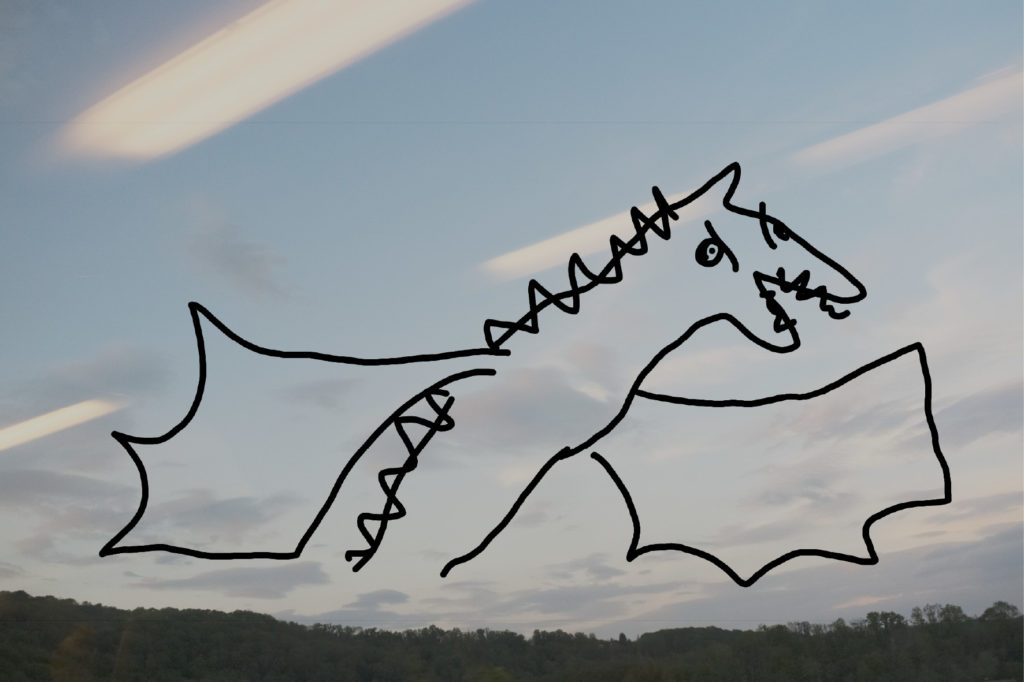
At the Mühlhausen train station,
the roofs of the bus shelters are rusting.
The uniform train station design
used by Deutsche Bahn
has already taken hold.
On the old station building,
a cartoon figure
pisses on an Israeli flag.
To the left
is a picture of a waving swastika flag.
They seem
to be around in these parts, too,
the lone perpetrators,
driven by the
brown rust of history,
still not cleared away,
clapped on the shoulder
by their relatives.
“We were young once, too.”
And anyway,
just because someone
covered something once with grafitti
doesn’t mean
the whole town…
“Right-wing extremists?
Listen,
those are our kids.”
An older lady sits down
in the four-person spot next to me.
She points to my stuff,
FAZ newspaper,
Süddeutsche Zeitung,
laptop,
backpack
and bag,
and asks:
“Is all that yours?”
“Yes,” I say.
“Do you want to talk about it?” I ask.
“No,” she says,
and pulls out all
her own stuff accusingly
and spreads it
on the three seats around her,
huffing in
exasperation.
But she’s right,
I should tidy up
my desk.
I almost feel sorry for her,
trapped in her
rusty thoughts.
But as long as she’s only mad
at my stuff,
that’s fine with me.
Although the question remains:
What is the nature of tidiness?
Toward the end,
I feel sympathetic toward her.
We’re all punk rock somewhere,
whether it’s me in my shirt
with littered space
or her with her sense of order
and shoes on the seat.
De-Jewing Institute
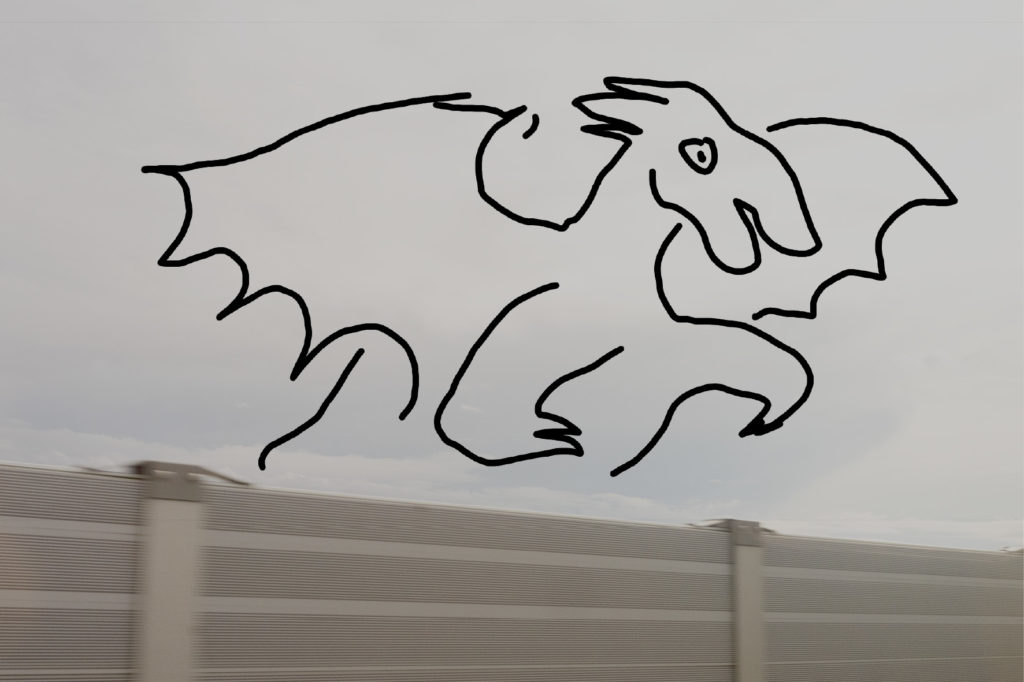
I’m sitting in the Martin Luther
on the way to Eisenach.
That’s the name of this high-speed train.
Naming a train in Germany
for an anti-Semite:
classic.
“Come on, back then
everyone was an anti-Semite,
even the Jews.”
Who says that?
The dragon
flying along by the train
winks at me again.
Over there, the bell tower in Weimar;
Buchenwald.
And here on the train,
the grandchildren of those who did it.
Now we start climbing the hill
to the former De-Jewing Institute.
It’s actually called the Wartburg.
Founded in 1939
by the Protestant church.
I read a report in the paper
about the Waldklinik Medical Center in Eisenberg.
They want to offer
kosher food now.
I’m looking forward to seeing the Wartburg.
My grandfather had
a model of the Wartburg in his office.
He had made it himself.
That was before the office
became the TV room.
“I want to die
like he did.”
We stood around his deathbed,
all of the remaining family members.
Not dying alone:
the final privilege.
I can still see the bell tower
of Buchenwald
on the horizon.
The train stops in Erfurt.
Passengers get on
and look for their reserved seats.
Martin Luther spits me
out in Eisenach.
20 minutes before the
Wartburg shuttle comes.
In downtown Eisenach,
a blind woman wanders around the street
between honking cars,
at the feet of Martin Luther’s statue.
Behind the memorial,
the dragon traces circles in the sky.
I help the blind woman get off the street,
and she attacks me:
“This isn’t where I wanted to go at all.”
Back at the bus stop,
the shuttle pulls up,
driven by a beaming bus driver
with a German baseball cap on his bald head.
The weather is pleasantly mild,
with a slight breeze from the right.
Three blocks along,
a knight
fights with
a dragon,
covered with verdigris.
For you.
For here.
The Eisenach CDU advertises.
I sit way up
in the former De-Jewing Institute,
at a café,
surrounded by tourists
who are just visiting the castle
to catch a glimpse
of the good old days
in the Middle Ages.
I order a double espresso
and water.
With tip, it comes to 10 euro.
Typing on my laptop,
I imagine
how Martin Luther
wrote his hate-filled tirades against the Jews
here, using a ripped-out goose feather,
and how later,
a bunch of Protestants
sat here at the very same table
and founded the Institute for the De-Jewing of Christianity.
My laptop is the new quill,
no longer ripped from an animal’s body,
no, its production conditions now
cut a swath of destruction
across the entire planet.
All a single cultural history
of barbarism,
to which we refer here
so romantically.
It’s 12:46.
Lunch is officially over,
and the restaurant is deserted.
Germans are
reliable in every way.
On the way to the train station,
I pass
the Wartburgsparkasse bank.
It’s the one the two Uwes
robbed back then,
before they blew
themselves up with a pump-action gun.
“All that is Germany,”
I hear in my head,
a song sung by Die Prinzen
as they stand in the Chancellor’s office
and make a fuss for Angela Merkel.
The faces of the people
on the streets
are neither sad nor happy.
Instead, they are striking
for their captivating
expressionlessness.
As if they were all
just doing their duty.
Going to work.
Shopping.
Eating.
Sleeping.
Cemetery
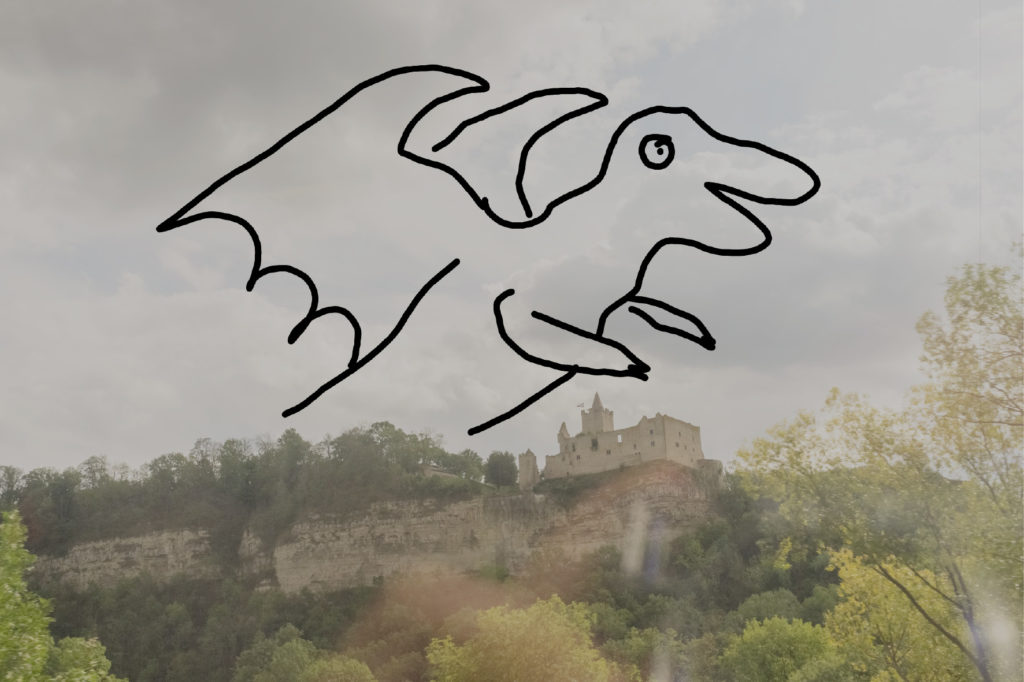
I sit in the front window of a bakery,
eating a sourdough roll with chia seeds
and drinking an espresso.
The lady baker
gave me a pat of butter on the house.
“It tastes so dry otherwise,”
she says.
I look out the window.
A man with a yellow armband walks by.
One of the three sewn-on points
looks about to fall off;
it’s hanging by a thread.
The roll tastes good.
Later, I drive through Gotha.
You can’t go to the Jewish cemetery there
unless you register in advance
with the city authorities;
in 2008, two men hung a pig’s head on the cemetery gate.
At the neighboring table, a mother
and her two sons,
around 10 years old,
discuss whether the salted almonds
don’t taste salty enough
for salted almonds.
Outside is an idyllic little house
with a little garden.
The sun comes out.
The sky is blue.
CoronaCentrifuge
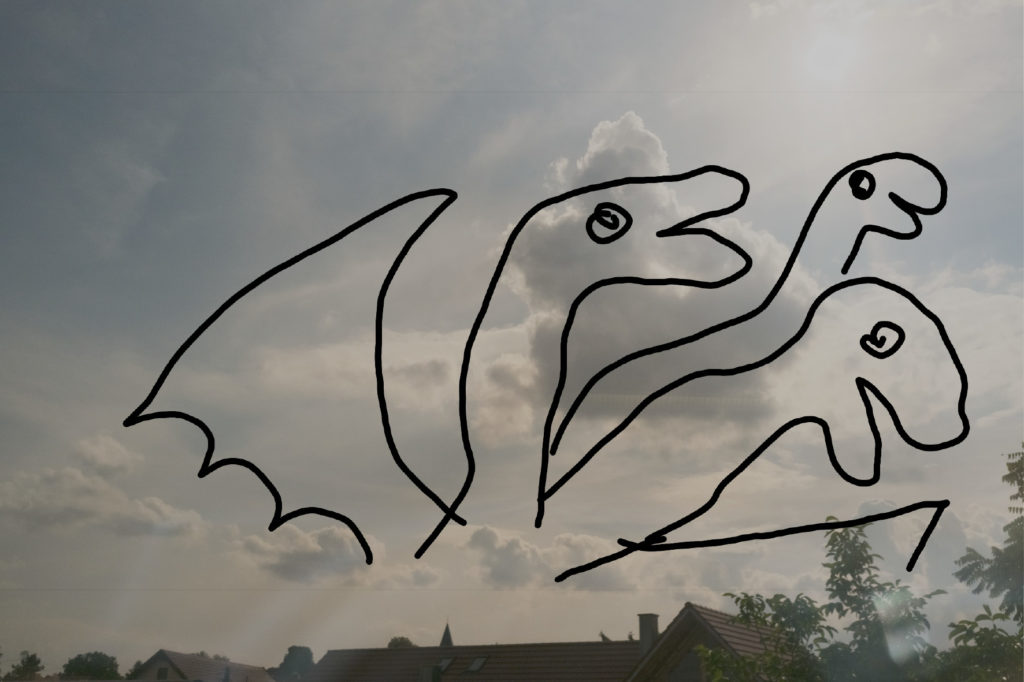
I take the CoronaCentrifuge
from Erfurt to Jena.
Halfway there,
the bell tower
reappears.
All around me,
beads of sweat
roll off foreheads,
get caught in masks,
or drip to the floor,
the last drops of sweat
the September sun
will wring out of us travelers this year.
Everyone is wearing a mask.
And no one babbles
about what they read the night before
in some
WhatsApp or Telegram group
by coronavirus conspiracy theorist Hildmann or his ilk.
And no one
talks openly
about those
who supposedly
invented the coronavirus.
And no one wishes
it on anyone else.
If I don’t catch COVID-19,
it was almost a good train trip
in Germany,
other than the fact that it was hot,
aside from the bell tower,
which I overlooked
so many times over the years,
the more I passed it,
when I still lived
among the dragons and the castles.
In the Mühltal valley, on the way to Jena, the dragon keeps getting stuck in the trees and falls behind.
Jewish Jena
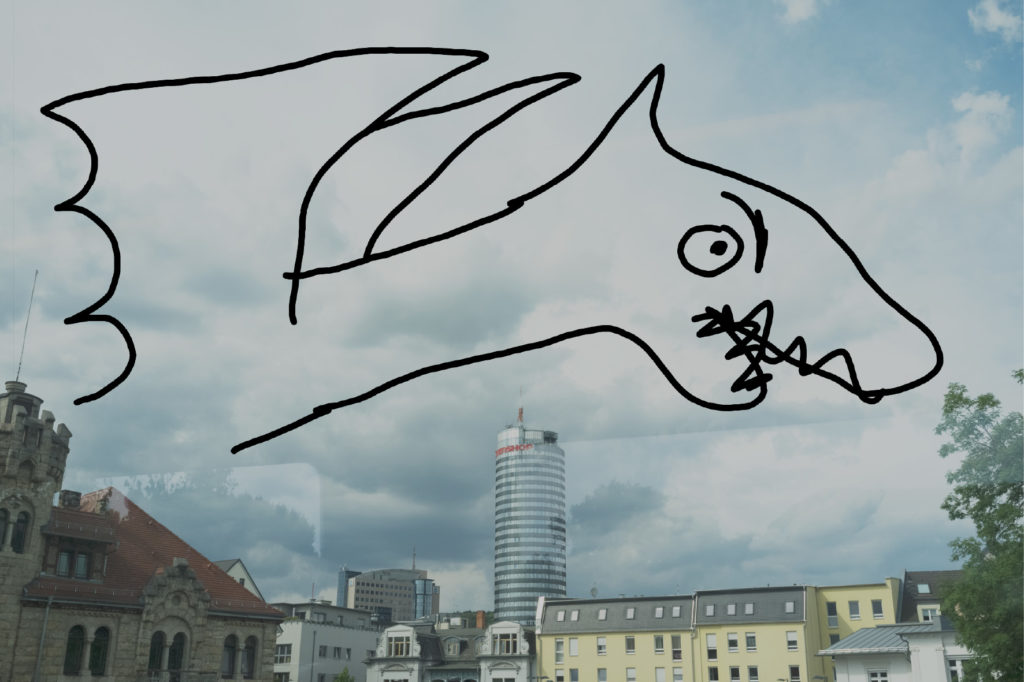
I’m sitting in the DB lounge
and working my way through
the coffee assortment.
Ice cream season is over.
The freezer plug is pointedly sitting on top of the freezer.
My train to Jena
is coming in 50 minutes.
It will catapult me back
home.
Back to
where a terrorist group
was radicalized:
Uwe, Uwe, Beate and friends.
Back to
where the NSU’s right-wing terrorism
started building its network across the whole country.
“Jena, do you have any Jews?”
I’d like to scream at my doll-sized little city,
even as I sit here in the DB lounge
over free coffee
with my special passenger status.
A thin woman about my age pours herself a Diet Coke.
I HAVE NEVER SEEN
A THIN PERSON
DRINKING DIET COKE,
shouts Donald Trump in my head.
The DB lounge employees are dealing with a bee
and ask her to make a detour.
The police once found
one of the Uwe’s
fingerprint
on a doll with a Star of David on it
hung from a freeway overpass.
At that point, he was convicted
because his alibi could not be verified.
They didn’t even know
who won the PlayStation game.
In the second instance, Uwe was
acquitted,
because
Uwe,
Uwe,
Beate, and Ralf suddenly
all remembered everything exactly:
Ralf won at PlayStation,
because Uwe
was playing it for the first time
and then they radicalized themselves
after that.
When the Erfurt soccer team
played Jena in Jena,
the Erfurt fans
were known to chant:
“Jewish Jena.”
All just individual screamers, of course.
Individual offenders.
Well, Erfurt,
where are Jena’s Jews now?
I leave the German National Railway employees
alone to deal with their bee issue.
The train enters the station.
Off we go, heading home.
Off to the city
where the optical industry
designs the rifle scope
so people all over the world can blow off each other’s heads.
Did the pump-action gun that Uwe and Uwe
used to blow off their heads
have a lens from Jena, too?
Pump-action guns
don’t have a scope,
murmurs the dragon,
who is back,
flying along by the train.
Brown stripes
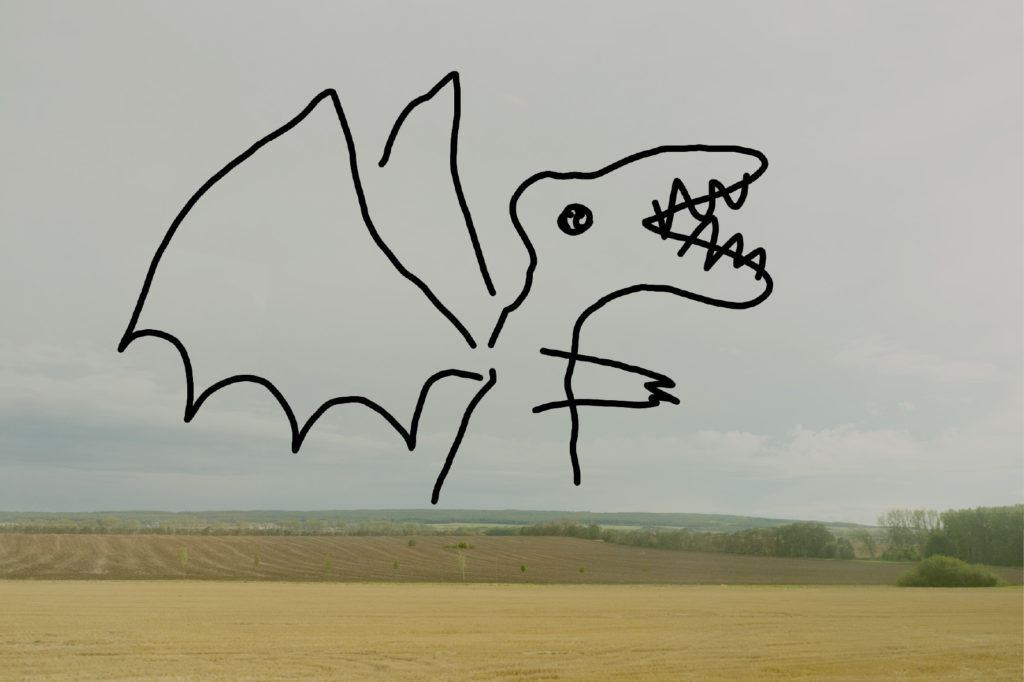
Outside, the landscape
passes by in brown stripes.
In the winter the fields are black,
seldom white.
In spring, yellow rapeseed fields.
In summer, red, burning trees.
In autumn it’s all brown again.
Black.
Gold.
Red.
Brown.
Next stop, Magdeburg.
Where the Halle
attacker is still on trial,
and analog bureaucrats try to understand the Internet.
At the Halle train station,
a giant pin-up
on a bordello firewall
looms over the roofs.
The train passes
two former
Russian barracks rotting away.
The Russians are gone,
and the state is using properties like these
for refugees less and less.
The concrete slab buildings look like the ones
from Freienbessingen,
a refugee camp from the 2000s
where I went with my cows-pigs-East Germany friends.
I came back with pictures:
broken sinks,
moldy wallpaper
and disconnected heaters,
photos for a campaign
to close the camp.
At least there, taking the bus
was worthwhile.
The camp was in fact
closed at some point.
But maybe only
because the government
found a cheaper per capita accommodation
somewhere else.
There was a fire
at the Moria camp a couple weeks ago,
and everyone said:
We told you so.
No one likes a wise guy.
Europe is blushing
as if it had been caught taking a shit.
Even Merkel is supposed to have said:
We knew it.
We’re all to blame,
and it doesn’t change anything
if we go to a solidarity protest
in the afternoon
before we stream
the planet to its knees
in the evening.
Whataboutism?
Welcome to hell.
It’s become cold.
The A/C is turned on inside the train
even though it’s only 10 degrees Celsius outside.
The sky is cloudy.
Here and there,
trees are already turning yellow.
Migratory birds gather
on the power lines,
ready to set off for the Mediterranean
and beyond,
while below them,
a few brown cows
await the winter.
What impact
will climate change
have on the migrating birds?
When will the first ones decide
to stop denying climate change
and blame the Jews
instead?
When the coronavirus pandemic
reached the white man,
it took just the blink of an eye.
The train compartment reeks
of perfume.
Outside,
matchbox cars
drive along
drawn-out rural roads.
Oh,
if only the rest of the world
would just stop
wanting to have
our privileges.
RV: Bang
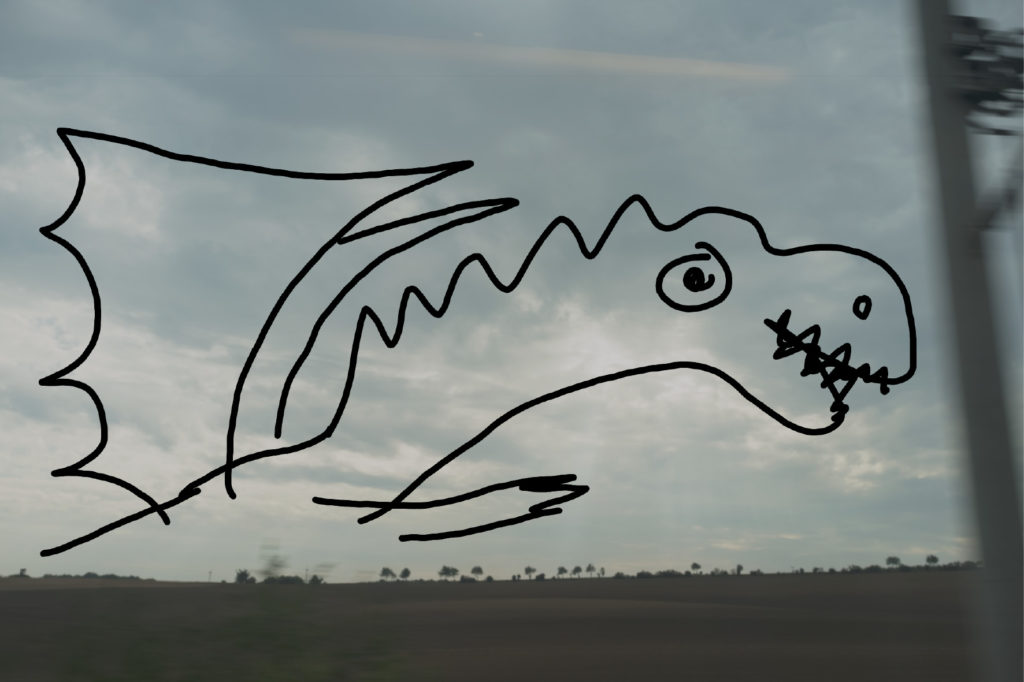
A solitary RV
is parked on a dirt road ,
with a grill in front.
Two men
and a woman
loll in folding chairs.
The sausages on the grill
are charred.
The men’s heads
hang back at an unnatural angle.
The woman drinks sparkling wine
out of the bottle.
Next to the RV
lies a scarecrow
with a Star of David patch sewn on it.
A couple of crows
pull straw out of it.
The RV explodes.
A black car
labeled as belonging to
German domestic intelligence
drives away.
I wake up.
Oh, if only it were so simple.
The happy faces
in the home improvement store
near the train platform
are faded.
A child is crying
again in the neighboring compartment.
The federal criminal authorities are
still asking for clues from the public.
The NSU investigations
aren’t over.
But shredded files
are shredded files.
A screaming child
makes the eyeballs of some of my
fellow travelers’
pop out in their eye sockets.
The dragon?
Where’s the dragon?
Woodchip apartment
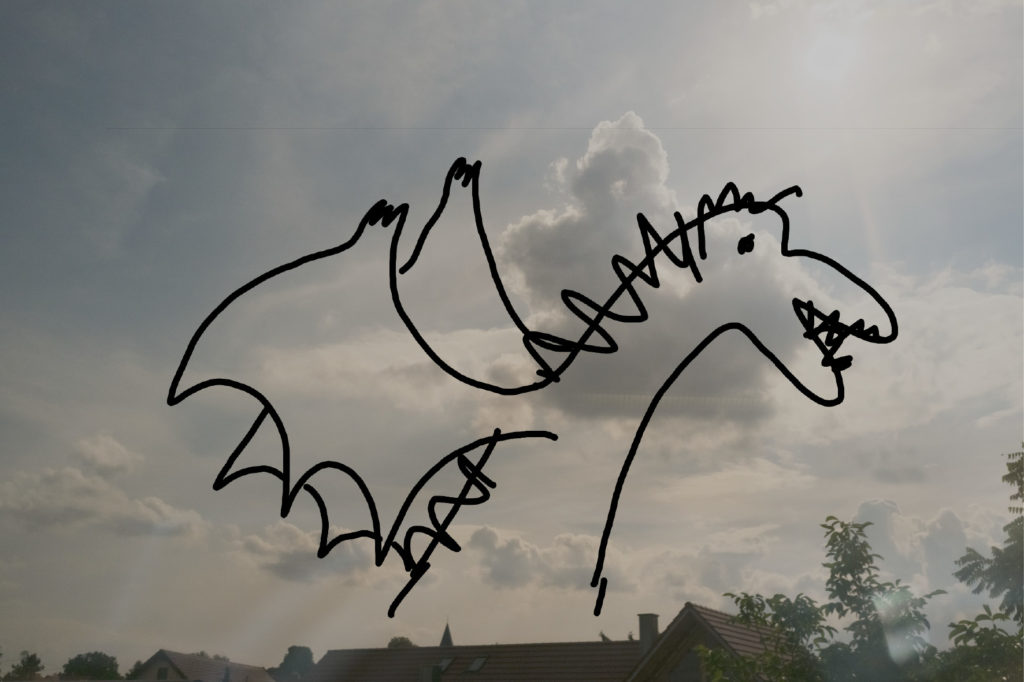
What am
I looking for here, anyway?
On the trail
of people hostile to Jews.
Is it a perverse German idea of
how to spend the summer?
To stick your finger in the wound
and from time to time
make some melancholy joke
suggested
from the sheer absurdity
of the circumstances.
The train stops somewhere
in the East German nirvana.
Around the former train station
are skinheads in under shirts.
They bought themselves a former
Holocaust shuttle
so they could live in it.
One of these pigs
has written
“Grandpa was all right”
in permanent marker on his under shirt.
The train starts moving.
I throw open the window and call out:
“Was your grandpa in the Resistance, too?”
As the clown starts to rage,
we leave the little town.
My grandfather wasn’t
in the Resistance at all.
I’m disgusted
at my own self-righteousness.
Is it enough
to throw words
in Nazis’ faces?
The sun
goes down.
A light is burning in the
Rudelsburg castle.
Home
at my apartment
in Connewitz
Woodchip wallpaper.
The walls as white
as an east German town,
or Connewitz itself.
The floor, light brown;
click laminate.